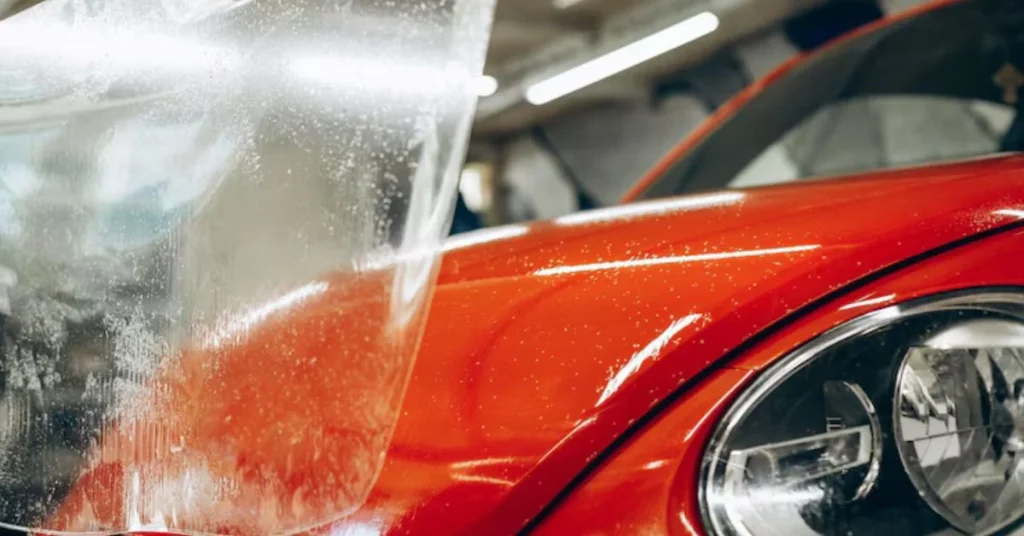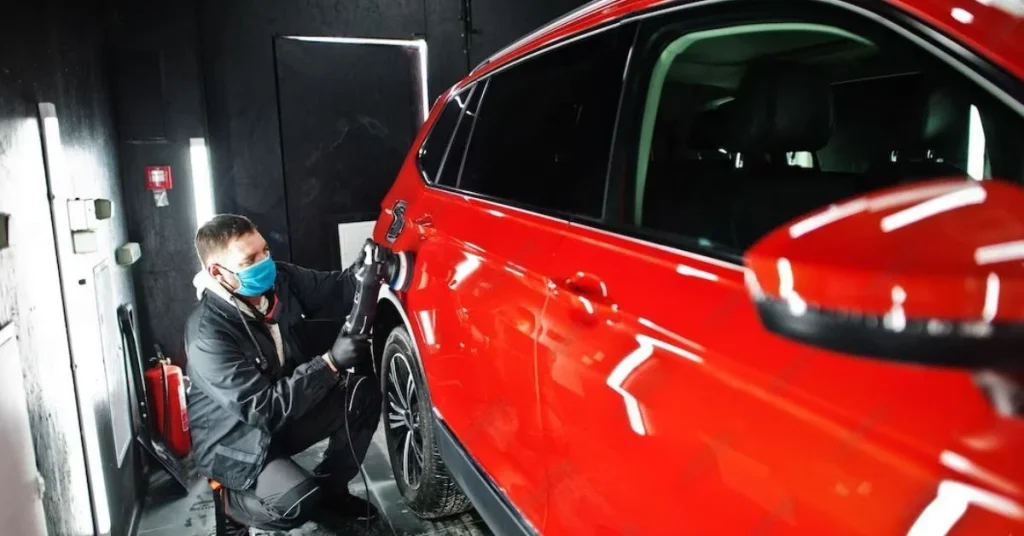For car enthusiasts and those who value keeping their vehicle looking showroom-fresh, protecting the paint job is a top priority. Scratches, chips and fading from everyday wear and tear can take a toll on a car’s appearance and resale value. This is where Paint Protection Film (PPF) comes in.
PPF, also known as clear bra, is a transparent film applied to the exterior of your car to shield the paint from scratches, chips, UV rays and other environmental elements. While it’s a popular choice for safeguarding a car’s finish, deciding whether paint protection film is a good investment for you requires careful consideration.
Table of contents
1. Understanding PPF and Its Benefits
2. Considering the Cost of PPF
3. Is PPF Right for You?
4. Alternatives to PPF
5. Beyond Paint Protection – Additional Benefits of PPF
6. Is PPF a Good Investment for Your Car?
7. Taking the Next Step
Understanding PPF and Its Benefits
PPF is typically made from thermoplastic polyurethane (TPU), a highly durable and flexible material. It acts as a barrier between your car’s paint and the outside world, absorbing the brunt of minor impacts from flying debris, road gravel and even shopping cart dings. Additionally, PPF offers UV protection, preventing the sun’s harmful rays from prematurely fading your car’s paint.
Here’s a closer look at the key benefits of PPF:
- Enhanced Scratch and Chip Resistance: PPF takes the hit from flying rocks and debris, minimising the risk of scratches and chips that can mar your car’s paint.
- UV Protection: Constant sun exposure can dull and fade a car’s paint. PPF acts as a shield, helping to maintain the original vibrancy of your car’s paint for longer.
- Self-Healing Properties: High-quality PPF has self-healing properties. Minor scratches and swirl marks can disappear with the application of heat, keeping your car looking flawless.
- Easier Cleaning and Maintenance: PPF creates a smooth, hydrophobic surface that repels dirt and grime. This makes washing and maintaining your car’s exterior significantly easier.
- Preserved Resale Value: A car with a well-maintained paint job will undoubtedly fetch a higher price when it’s time to sell or trade-in. PPF can significantly contribute to preserving your car’s resale value.

Considering the Cost of PPF
While PPF offers a multitude of benefits, it’s important to acknowledge the upfront investment. PPF Cost can vary depending on several factors:
- Size and Make of Your Car: Larger vehicles naturally require more film, driving up the PPF coating price.
- Quality of the Film: Higher-quality films with superior scratch resistance, self-healing properties and longer lifespans will cost more than basic films.
- Coverage Area: You can choose to protect the entire car (full-body PPF) or focus on high-impact zones like the hood, bumper and fenders (partial coverage). Full-body coverage will be more expensive.
- Installer Experience: A skilled and experienced installer is crucial for a flawless, bubble-free application. Professional installation may come at a premium compared to a DIY approach.
Is PPF Right for You?
Here are some factors to consider when deciding if PPF is a worthwhile investment for your car:
- How long do you plan to keep your car? If you intend to keep your car for a long time and want to maintain its pristine condition, PPF can be a smart investment.
- Where do you park your car? Garage-kept vehicles are less exposed to the elements and have a lower risk of damage compared to cars parked outdoors regularly.
- How much do you value the appearance of your car? If you take pride in keeping your car looking its best, PPF can help you achieve that goal.
- Budget: PPF cost can be a significant upfront investment. Be sure it aligns with your budget for car care.

Alternatives to PPF
While PPF offers superior protection, there are other options for car paint protection to consider:
- Ceramic Coating: A ceramic coating is a liquid applied to the car’s paint, creating a hydrophobic layer that repels dirt and offers some scratch resistance. It’s generally less expensive than PPF but doesn’t offer the same level of protection against physical damage.
- Waxing: Regular waxing provides a layer of protection against the elements and minor scratches. However, waxing needs to be reapplied more frequently compared to PPF or ceramic coating.
- DIY vs. Professional Installation: While PPF installation kits are available, achieving a flawless, bubble-free application is challenging. Professional installers have the experience and tools to ensure a perfect fit, maximising the benefits of PPF and preserving your car’s value.
- Maintenance of PPF: PPF requires minimal maintenance but should be washed and cared for properly. Avoid harsh chemicals and abrasive cleaners that can damage the film. Opt for gentle car wash soaps and microfiber cloths for optimal results.
- Lifespan of PPF: High-quality PPF can last up to 10 years with proper care. However, factors like sun exposure and environmental conditions can influence its lifespan. Consult your installer for specific recommendations on maintaining your PPF film.
- Warranty: Look for a reputable installer who offers a warranty on both the film and the installation process. This ensures peace of mind in case of any issues with the PPF.
Beyond Paint Protection: Additional Benefits of PPF
The advantages of PPF extend beyond just safeguarding your car’s paint. Here are some additional benefits to consider:
- Improved Aerodynamics: Certain PPF films have a smoother texture compared to standard paint, potentially leading to slightly improved aerodynamic properties and fuel efficiency.
- Reduced Noise: Some PPF films act as a slight sound barrier, potentially reducing road noise for a quieter cabin experience.
- Long-Term Value: A well-maintained car with protected paint will undoubtedly have a higher resale value compared to a vehicle with a neglected or damaged exterior. PPF can significantly contribute to maximising your car’s value in the long run.
The Final Verdict: Is PPF a Good Investment for Your Car?
There’s no one-size-fits-all answer when it comes to PPF. It’s a worthwhile investment if you prioritise the following:
- Preserving the showroom finish of your car for an extended period.
- Protecting your car from everyday wear and tear, including scratches, chips and UV damage.
- Maintaining a high resale value for your vehicle.
However, if you’re on a tight budget, primarily use your car for short commutes or aren’t overly concerned with minor paint imperfections, exploring alternative paint protection options like ceramic coating or regular waxing might be sufficient.
Remember: PPF Cost is an upfront investment. Weigh the PPF coating price against the long-term benefits it offers to determine if it aligns with your budget and priorities.
Taking the Next Step
If you’re leaning towards PPF, conducting thorough research is crucial. Here’s how to get started:
- Research different PPF film brands and their features.
- Get quotes from reputable installers in your area.
- Ask for references and check online reviews for installers.
- Discuss your specific needs and budget with the installer to determine the best PPF option for your car.
By carefully considering the factors outlined above, you can make an informed decision about whether PPF is the right choice for your car. With proper care and maintenance, PPF can be a valuable investment that keeps your car looking its best for years to come.







